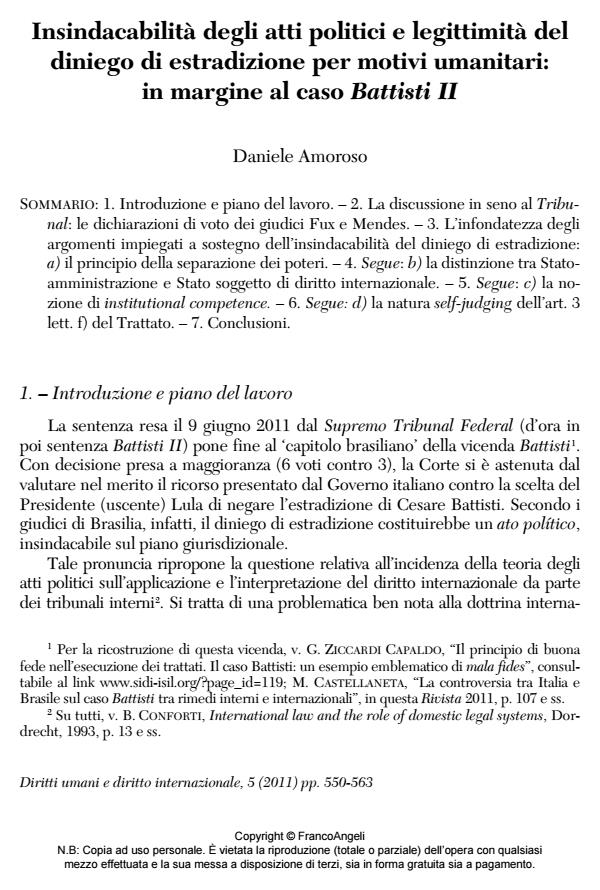Non-reviewability of political acts and lawfulness of the denial of extradition for humanitarian reasons: some remarks on the Battisti extradition case
Journal title DIRITTI UMANI E DIRITTO INTERNAZIONALE
Author/s Daniele Amoroso
Publishing Year 2011 Issue 2011/3
Language Italian Pages 14 P. 550-563 File size 187 KB
DOI 10.3280/DUDI2011-003005
DOI is like a bar code for intellectual property: to have more infomation
click here
Below, you can see the article first page
If you want to buy this article in PDF format, you can do it, following the instructions to buy download credits

FrancoAngeli is member of Publishers International Linking Association, Inc (PILA), a not-for-profit association which run the CrossRef service enabling links to and from online scholarly content.
With a majority judgment delivered on 9 June 2011, the Supremo Tribunal Federal definitively ended the ‘Brazilian chapter’ of the Battisti case. Notably, the majority refused to pronounce itself on the appeal lodged by the Italian government against the denial of extradition of Battisti by the (outgoing) President Lula, having established that the latter was a political act immune from judicial scrutiny. This finding was justified by the Tribunal on the basis of three rationales. Firstly, by relying on the principle of separation of powers, the majority maintained that foreign affairs choices (including that of denying extradition) are constitutionally committed to the Executive alone and cannot be reviewed by courts. Secondly, it affirmed that national courts cannot assess the legality of acts carried out by their own State as a subject of international law. Thirdly, it stated that the Judiciary lacks institutional competence to deal with foreign affairs-related matters. Besides this, it is worth recalling that the Brazilian Advocate General suggested to reject the Italian appeal because of the selfjudging nature of the humanitarian exception set forth by art. 3 lett. F) of the Extradition Treaty between Italy and Brazil. The present article tries to confute each of these arguments, by arguing that the Tribunal should have ruled on the merits of the case.
Daniele Amoroso, Insindacabilità degli atti politici e legittimità del diniego di estradizione per motivi umanitari: in margine al caso Battisti II in "DIRITTI UMANI E DIRITTO INTERNAZIONALE" 3/2011, pp 550-563, DOI: 10.3280/DUDI2011-003005